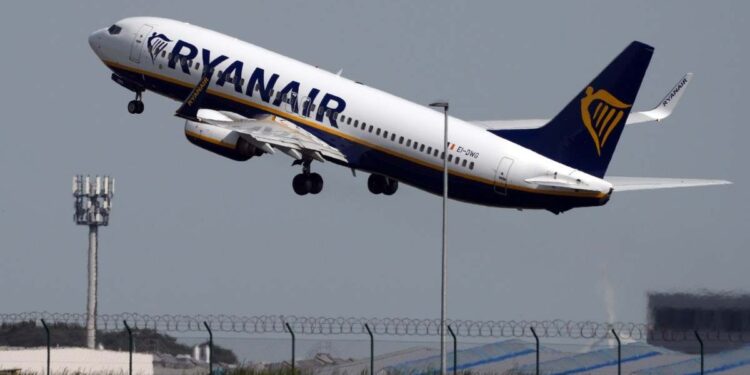Ryanair was the most polluting airline in the world in 2023 for the third consecutive year with 15 tons of carbon dioxide (CO2) emitted throughout the year, according to an emissions study conducted by Transport & Environment (T&E), followed by Lufthansa and British Airways, who kept their emissions levels below those from before the pandemic.
However, Ryanair reached its highest emission levels in history, exceeding 2019 levels by 23%. The same is true for other European ‘low-cost’ airlines, such as Wizz Air, whose CO2 tons generated in 2023 were 40% higher than those in 2019.
And it’s true that ‘low-cost’ airlines are increasingly dominating the market. If in 2019 one out of every five flights in Europe was operated by Ryanair, Wizz Air, or easyJet, in 2023 the proportion has increased to one out of every four.
T&E’s Aviation Director, Jo Dardenne, points out that the low-cost business model is “driving unsustainable growth”, a pace that sustainable aviation fuel (SAF) production cannot keep up with.
However, despite the growth of low-cost airlines, traditional and third-country companies are responsible for 42.2% of emissions because they fly long distances.
“Flying is too cheap”, emphasizes Dardenne, calling for an end to “this absurd situation where a passenger pays more for their coffee at the airport than some companies do for their emissions.”
Airbus laments the safety crisis at Boeing
The President of Commercial Aircraft at Airbus Spain, Ricardo Rojas, has lamented Boeing’s safety crisis due to the 737 MAX 9 failures after the incident with Alaska Airlines in January, adding that “it is not beneficial for anyone.”
“Normal people when they are about to board a plane will not distinguish between a Boeing and an Airbus and, therefore, that is not good for anyone, neither for the companies nor for the industry in general,” he argued during his participation in the ‘Wake Up! Spain’ forum of ‘El Español’.
For Rojas, 2023 has been “a success,” highlighting the A320 model as a “star product,” which has accumulated a total of 1,675 orders. He also noted the more than 300 orders for the A350 last year, “also a success for that range of wide-body aircraft.”
Regarding the industry’s current situation, the Airbus executive has celebrated the recovery of the aviation industry, as current flight numbers are higher than before the Covid-19 pandemic, referring to both domestic and international operations.
Looking ahead to 2024, Rojas has recalled the goal of delivering around 800 aircraft, which would be 65 more planes than the previous year. “All the models we have in the pipeline will increase their production, reaching their peak in 2026,” he added.
In addition, the European manufacturer also expects to achieve an adjusted operating profit (Ebit) of between 6.5 billion and 7 billion euros and a cash flow of around 4 billion euros.


